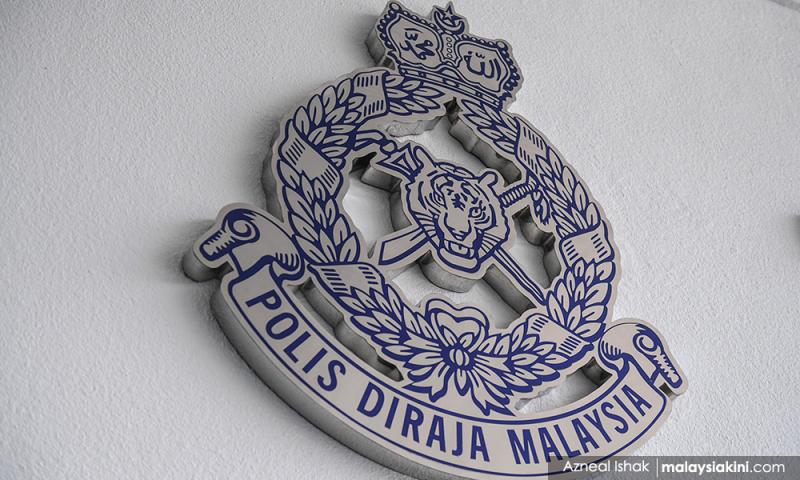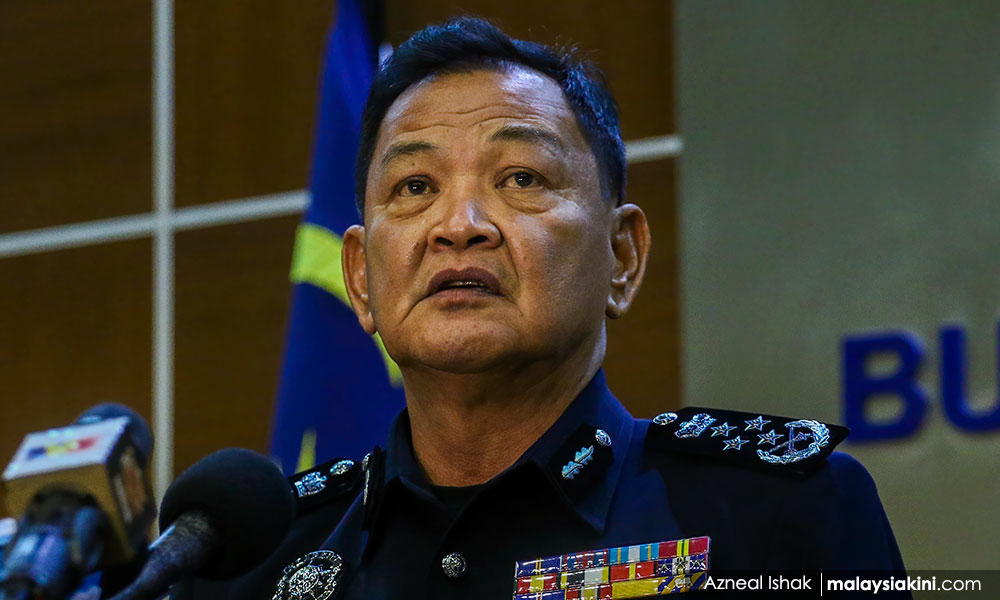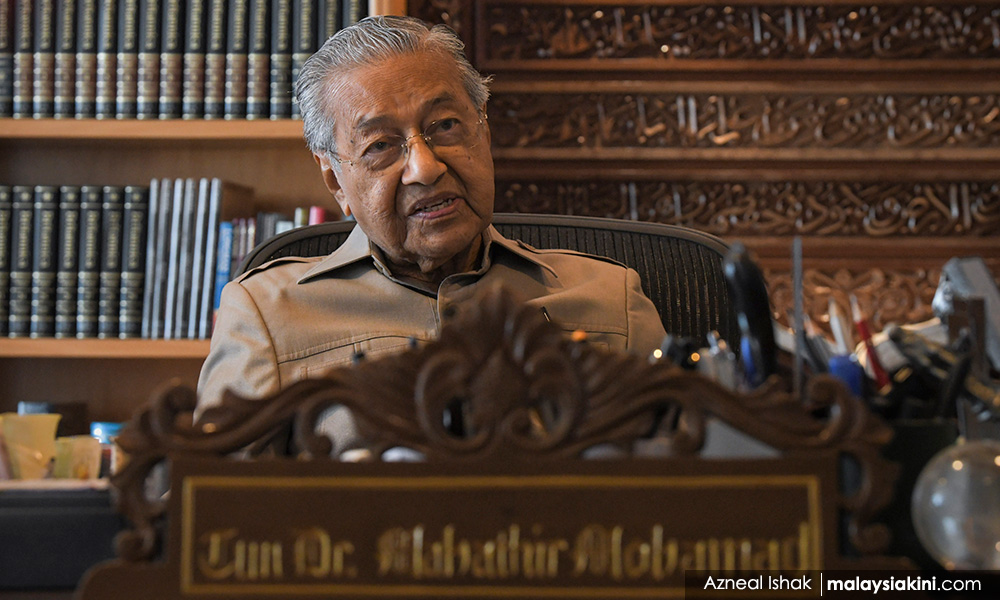
S Thayaparan
"Police business is a hell of a problem. It’s a good deal like politics. It asks for the highest type of men, and there’s nothing in it to attract the highest type of men. So we have to work with what we get...”
COMMENT | In March last year, then inspector-general of police Abdul Hamid Bador when describing his frustration at the bribery going on within his organisation with the allegations made against 12 police officers said this:
“The one who takes (the bribe) is the husband, if they don’t think about the fate of the family, then they can carry on, and if they are caught, there will be no point of feeling remorse as there have been enough warnings and advice given.”
This is the problem right here with the Royal Malaysia Police Force (PDRM). All these “warnings” and “advice” for dirty cops are exactly why the security apparatus is in the state it is in.
Everyone knows that there are corrupt cops but everyone also knows that they will be advised or warned not to carry on being corrupt cops.
But why only be concerned with the rank and file? The reality is that the police top brass is involved in corrupt practices – or at least that is what was alleged by the high ranking members of the state security apparatus – as described in Copgate.
In that sordid case what we were witness to is the power plays that went on between two former high-ranking police officers, which no doubt crosses from the bureaucratic to the criminal if the allegations and counter-allegations are to be believed.
It also highlights the shadowy nexus between organised crime and law enforcement with added racial overtones, which is naturally par for the course in this country.
In this example, do you really think that political operatives in the establishment were in the dark? Keep in mind that the then home minister Hishammuddin Hussein said: "Prove it, prove it. If they prove it, we can take action." Unfortunately for him, there was proof under his nose, as detailed here.

Former inspector-general of police Abdul Hamid Bador
Home Minister Hamzah Zainudin's audiotape of him extolling the benefits of promoting “our boy” to the top Special Branch job, is merely business as usual between the political class and the state security apparatus.
Hamid accusing Hamzah of political interference was merely the cherry on the manure cake as far as the former IGP’s accusations that he was being targeted by a cartel whose aim was to take him down.
The fact that he was replaced demonstrates that, unlike IGPs of the past who jealously guarded their position with the aid of political backers, it is obvious that for whatever reasons, Hamid did not have this safety net.
The police force has become a culture of its own succoured by religion, racialism and handouts, riddled with corruption and sharing a symbiotic relationship with the criminal underclass of Malaysian society and beholden to political masters who have always been engaged in protracted internal power struggles.
I am sure there are good cops in the PDRM. The irony, of course, is that good cops may also be part of the system of low-level corruption, but they carry out their duties in a way that is beneficial to whichever social strata they engage with.
The system is complicated and it would be simplistic to ignore such realities.
However, I would argue that reforming the PDRM is more a political problem than an institutional one.
Political operatives stand to benefit
While social activists, former law enforcement officers and various pressure groups are clamouring for reform, the people most often standing in their way are not from the PDRM – who do want reform for various reasons – but political operatives who stand to benefit from alliances with power groups within the police force.
The fact that when Pakatan Harapan was in power, they chose by omission to endorse the victimhood narrative of the state security apparatus when it comes to oversight, should tell us everything we need to know about efforts to reform the PDRM.
Keep in mind that the Suhakam findings in the disappearance of Pastor Raymond Koh and social activist Amri Che Mat revealed the Special Branch was behind the disappearance of both these individuals.

"Police business is a hell of a problem. It’s a good deal like politics. It asks for the highest type of men, and there’s nothing in it to attract the highest type of men. So we have to work with what we get...”
- Raymond Chandler
COMMENT | In March last year, then inspector-general of police Abdul Hamid Bador when describing his frustration at the bribery going on within his organisation with the allegations made against 12 police officers said this:
“The one who takes (the bribe) is the husband, if they don’t think about the fate of the family, then they can carry on, and if they are caught, there will be no point of feeling remorse as there have been enough warnings and advice given.”
This is the problem right here with the Royal Malaysia Police Force (PDRM). All these “warnings” and “advice” for dirty cops are exactly why the security apparatus is in the state it is in.
Everyone knows that there are corrupt cops but everyone also knows that they will be advised or warned not to carry on being corrupt cops.
But why only be concerned with the rank and file? The reality is that the police top brass is involved in corrupt practices – or at least that is what was alleged by the high ranking members of the state security apparatus – as described in Copgate.
In that sordid case what we were witness to is the power plays that went on between two former high-ranking police officers, which no doubt crosses from the bureaucratic to the criminal if the allegations and counter-allegations are to be believed.
It also highlights the shadowy nexus between organised crime and law enforcement with added racial overtones, which is naturally par for the course in this country.
In this example, do you really think that political operatives in the establishment were in the dark? Keep in mind that the then home minister Hishammuddin Hussein said: "Prove it, prove it. If they prove it, we can take action." Unfortunately for him, there was proof under his nose, as detailed here.

Former inspector-general of police Abdul Hamid Bador
Home Minister Hamzah Zainudin's audiotape of him extolling the benefits of promoting “our boy” to the top Special Branch job, is merely business as usual between the political class and the state security apparatus.
Hamid accusing Hamzah of political interference was merely the cherry on the manure cake as far as the former IGP’s accusations that he was being targeted by a cartel whose aim was to take him down.
The fact that he was replaced demonstrates that, unlike IGPs of the past who jealously guarded their position with the aid of political backers, it is obvious that for whatever reasons, Hamid did not have this safety net.
The police force has become a culture of its own succoured by religion, racialism and handouts, riddled with corruption and sharing a symbiotic relationship with the criminal underclass of Malaysian society and beholden to political masters who have always been engaged in protracted internal power struggles.
I am sure there are good cops in the PDRM. The irony, of course, is that good cops may also be part of the system of low-level corruption, but they carry out their duties in a way that is beneficial to whichever social strata they engage with.
The system is complicated and it would be simplistic to ignore such realities.
However, I would argue that reforming the PDRM is more a political problem than an institutional one.
Political operatives stand to benefit
While social activists, former law enforcement officers and various pressure groups are clamouring for reform, the people most often standing in their way are not from the PDRM – who do want reform for various reasons – but political operatives who stand to benefit from alliances with power groups within the police force.
The fact that when Pakatan Harapan was in power, they chose by omission to endorse the victimhood narrative of the state security apparatus when it comes to oversight, should tell us everything we need to know about efforts to reform the PDRM.
Keep in mind that the Suhakam findings in the disappearance of Pastor Raymond Koh and social activist Amri Che Mat revealed the Special Branch was behind the disappearance of both these individuals.

Former prime minister Dr Mahathir Mohamad
And what did the then Harapan prime minister Dr Mahathir Mohamad say? He said: "I think they must produce some evidence, this is merely hearsay."
And of course, Mahathir also blamed the former regime. Which is strange because, with all the detentions of politicians, activists, journalists and citizens under his watch, one would think that he would be aware of what the Special Branch is capable of.
And if you think that all this is bad, never forget about the mass graves of Wang Kelian. Also, keep in mind that Special Branch reports that were highlighted in the press claimed that 80 percent of law enforcement and security officers at Malaysian borders are corrupt.
"The enemy we have to fight is one that operates as an institution. We are dealing with institutionalised corruption so deeply entrenched that expecting internal discipline is like asking the chief crook to rat out on his runners," a Special Branch officer had said.
And what did Ahmad Zahid Hamidi do when 12 police personnel were detained for their role in the mass graves of Wang Kelian? Well, Zahid said that there was no evidence and released them.
So, does anyone really think that political operatives really want an IPCMC (Independent Police Complaints and Misconduct Commission)?
It seems to me, and maybe to you, too, that having any kind of oversight would hamper the way how the state security apparatus and the political class interact.
Not many political operatives want this to change.
S THAYAPARAN is Commander (Rtd) of the Royal Malaysian Navy. Fīat jūstitia ruat cælum - "Let justice be done though the heavens fall"
And what did the then Harapan prime minister Dr Mahathir Mohamad say? He said: "I think they must produce some evidence, this is merely hearsay."
And of course, Mahathir also blamed the former regime. Which is strange because, with all the detentions of politicians, activists, journalists and citizens under his watch, one would think that he would be aware of what the Special Branch is capable of.
And if you think that all this is bad, never forget about the mass graves of Wang Kelian. Also, keep in mind that Special Branch reports that were highlighted in the press claimed that 80 percent of law enforcement and security officers at Malaysian borders are corrupt.
"The enemy we have to fight is one that operates as an institution. We are dealing with institutionalised corruption so deeply entrenched that expecting internal discipline is like asking the chief crook to rat out on his runners," a Special Branch officer had said.
And what did Ahmad Zahid Hamidi do when 12 police personnel were detained for their role in the mass graves of Wang Kelian? Well, Zahid said that there was no evidence and released them.
So, does anyone really think that political operatives really want an IPCMC (Independent Police Complaints and Misconduct Commission)?
It seems to me, and maybe to you, too, that having any kind of oversight would hamper the way how the state security apparatus and the political class interact.
Not many political operatives want this to change.
S THAYAPARAN is Commander (Rtd) of the Royal Malaysian Navy. Fīat jūstitia ruat cælum - "Let justice be done though the heavens fall"

What does the good commander expect? This is Kerajaan Allah having a guard dog (which is the police) at its disposal to do its (Kerajaan Allah) bidding.
ReplyDeleteOf course there is no "heart" to change or "improve" the system.
And where is the MACC supposedly our guardian on corruption? MIA!
All the Diraja institutions the Council of Rulers must titah for reform.
ReplyDeleteA retired senior policeman in my group has stated categorily that most of the top 3-4 top layers of PDRM are ranging from somewhat to heavily corrupt.
ReplyDeleteFor the rest lower down, your future prospects depend on whether you Click with this bunch.
That's why making a police report against organised criminal activity in Malaysia can be a dangerous, even fatal act.
You will get a most unfriendly visit from crooks leaked the information, or even by crooked police themselves.